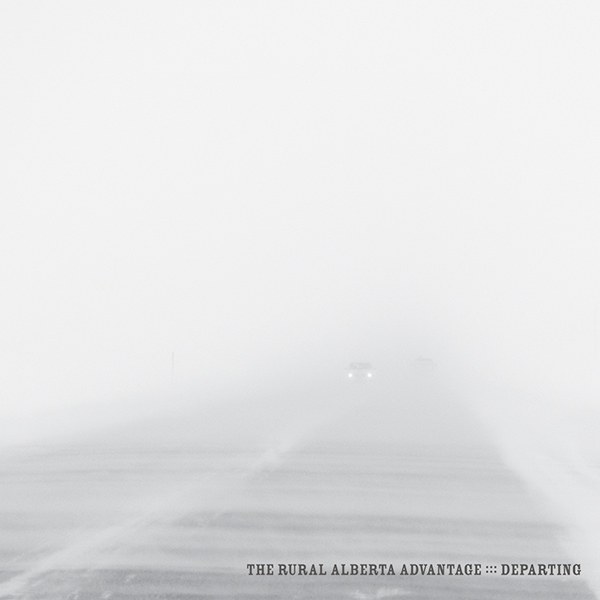While writing about oneself is anything but an original idea, well executed autobiographical works can make listeners experience things they can’t otherwise. People love to walk through the lives of others; it fascinates us. Such was the case with Hometowns, the excellent 2008 debut album from the Rural Alberta Advantage. What follows is the hardest trick in music: creating something new when you’ve already exhausted your best stories. As everyone knows, pop is littered with one-trick-ponies, and in the new world of social media it becomes even harder for an artist not to feel the pressure for a successful follow-up.
On the surface, little has changed for the RAA. Nils Edenloff’s singing still emulates the untreated vocal dabbling of Jeff Mangum and Amy Cole’s keyboards still lightly coats the frenzied beat of Paul Banwatt. Even certain songs, most notably “Barnes’ Yard,” feel like they’re directly lifted from the debut. There is, however, a slight change in mood, as Departing is a tad more melancholy than its predecessor. The album kicks off with “Two Lovers,” a folksy song that briefly relives the failed expectations of a past relationship. From there, the album seems like an elongated breakup letter. On lead single “Stamp,” Edenloff sings, “And the hardest thing about this love is that it’s never gonna last, and the hardest thing about this love is that you’re never coming back.” It would seem that he’s singing to an old flame, but given the other lyrical content on the album it seems more likely he’s giving his last goodbyes to his Canadian childhood. Such is made clear on album closer “Good Night,” “Goodnight to the northern winters and the heartless sinners, I haven’t seen you now for a while, going to miss you more with time.”
Outside of tracks like “Muscle Relaxants” and the aforementioned “Barnes’ Yard” and “Stamp,” the album spends the duration in mid-tempo mode. Even for a shorter album like Departing, that’s a lot of slow-moving music. Much of it holds true to the formula employed on the debut. It makes repeated listens more difficult as the album so easily turns into background music rather than an engaging listen. Several of these tracks, such as “Tornado ’87,” would be better served played with more fervor and speed.
The sophomore album is often the hardest to make for artists and just as frequently the hardest to appraise. A debut is generally the product of years of songwriting, struggle, refinement, reinvention, and second guessing. With the sophomore album, especially one from risers like the Rural Alberta Advantage, that entire process must be heavily compressed for the first time. Sometimes that delivers Room On Fire; sometimes that delivers Nevermind. Most often, it delivers what you get on Departing: an enjoyable but still not entirely satisfying collection of songs that don’t really work as well together as they do apart.

